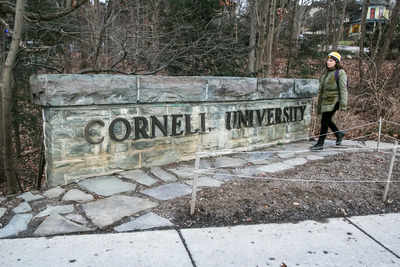- News
- Education News
- News
- Cornell, Northwestern caught in crossfire as White House freezes funds
Trending
Cornell, Northwestern caught in crossfire as White House freezes funds
The Trump administration has frozen over $1.7 billion in federal funds to Cornell and Northwestern, intensifying pressure on elite universities amid claims of failing to safeguard Jewish students during pro-Palestinian protests. As federal scrutiny expands and billions more are under review, institutions now face growing uncertainty over academic freedom, research continuity, and political influence on campus governance.
Two of America’s most prestigious institutions—Cornell and Northwestern—are facing an unprecedented federal clampdown. This week, the Trump administration froze over $1.79 billion in federal funding to the universities, citing alleged failures to protect Jewish students amid last year’s pro-Palestinian campus protests. The funding freeze marks the most dramatic escalation in a wider federal offensive that has already disrupted financial pipelines to multiple Ivy League schools.
According to a US official who spoke to The Guardian, the withheld funds pertain largely to federal grants and contracts spanning critical domains—health, education, agriculture, and defense. With the latest move, the administration has now frozen at least $3.3 billion in federal aid to elite universities, signaling a broader ideological battle brewing at the intersection of academia, protest politics, and federal authority.
Rising federal intervention
The financial penalties imposed on Cornell and Northwestern are not isolated. In recent weeks, several other high-profile universities, including Harvard, Columbia, Princeton, Brown, and the University of Pennsylvania, have come under similar federal scrutiny. With at least $3.3 billion in funding already frozen across multiple campuses and additional institutions under review, the academic landscape is facing one of its most significant confrontations with federal authority in recent history.
Research and innovation at risk
For institutions like Northwestern, which has long been recognized for its research in medicine and technology, the implications of this funding freeze are considerable. Government-backed projects related to public health, scientific innovation, and national defense may now face delays or discontinuation. This jeopardizes not only academic progress but also broader contributions to society in areas like medical devices, disease research, and technological advancement.
The abrupt halting of funds disrupts years of research planning and undermines the collaborative relationship between universities and federal agencies. Across affected institutions, scholars and administrators alike are contending with the uncertainty of paused projects and the potential long-term erosion of academic stability.
The political undercurrents
The current wave of federal actions stems from heightened political sensitivities surrounding last year’s campus protests. Demonstrations that took place in the wake of military conflict in the Middle East have become flashpoints in a national debate about the boundaries of protest, the definition of antisemitism, and the rights of students to express dissenting views on foreign policy.
The administration has positioned these crackdowns as necessary responses to campus climates it deems hostile or unwelcoming. However, many observers see the moves as attempts to reshape university governance by linking compliance with political priorities to access to federal support.
A tense road ahead
With financial levers being used to influence academic policy, universities now face difficult decisions. Balancing institutional autonomy with the demands of federal oversight has become increasingly precarious. The threat of prolonged or expanded funding freezes forces institutions to consider whether they must compromise on principles of academic freedom in order to maintain operational viability.
As investigations continue and additional schools come under review, the broader question is whether these developments signal a new era of federal influence over American higher education—or a temporary, politically charged episode. What remains clear is that the traditional boundaries between academia and the state are being redrawn, and the consequences will likely resonate across the country for years to come.
End of Article
Follow Us On Social Media










